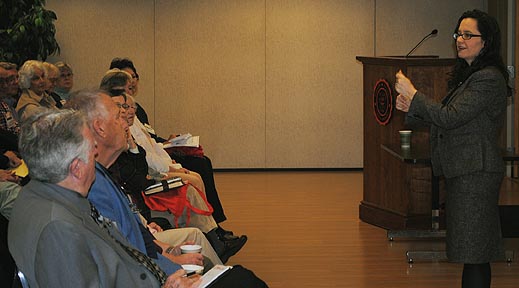
The Rev. Carol Howard Merritt discusses how churches can bring different generations together during the first session Tuesday of the Theologian-in-Residence lecture series.
Churches have the unique opportunity in today’s society to nurture intergenerational connections, said the Rev. Carol Howard Merritt during the first session of the Theologian-in-Residence lecture series at Tusculum College.
Rev. Merritt, author of “Tribal Church” and “Reframing Hope,” is leading the annual series, which is co-sponsored by the Holston Presbytery and Tusculum College with funding assistance from Ron Smith.
As the session began, Merritt asked participants to pair off into twos and share with each other the various factors that helped form them as a person, including political, technological and cultural forces that were important to their development. She then asked individuals to share with the whole group the things that were important to them.
Influences of family, church, parents who had experienced the Great Depression and rationing of World War II and the acceptance of what parents and governmental authorities said as truth were among factors mentioned by some of the older attendees, which included a number of people in their 60s through 90s.
People in their 40s or younger talked about the influences of technology in their lives, a distrust of government and other authority and the impacts of tragedies such as the Challenger explosion, the Columbine and Virginia Tech school shootings and the Sept. 11 attacks.
Through what people expressed of their own histories, the shifts in society can begin to be seen, said Merritt, who is co-host of God Complex Radio and blogger for Christian Century and Huffington Post. For many mainline denominations, the 1950s and 60s are seen as a time of great building, not only of buildings and other facilities, but congregations as well, she continued, but a transition began in the late 1960s and 1970s with the Vietnam War, political scandals and even scandals involving church leaders that has changed how younger generations think about authority.
Changes are also occurring in commerce away from the idea that “bigger is always better,” she noted. “But, something has changed. Right now, there is a longing for smaller communities and smaller things. There is a movement toward going back to the idea that we could have enough for everyone if we shared.”
In churches, more small groups are being creating and there is a greater appreciation for small churches, Merritt said.
“Communication has changed,” she continued. “Almost everything is at your fingertips now. That can be exciting and it can be scary.”
Asked about the challenges this instant availability and expectation of information can create when a time for discernment is also needed, Merritt said that she would advise that all communications be as open and gracious as it can possible be.
“Each generation communicates differently and that can be incredibly frustrating to church leaders who don’t have all the time in the world to communicate in all those ways,” she said.
While significant changes have occurred, there is a need for connectedness that continues, Rev. Merritt noted. Mobility has been always been a part of the American way of life, she continued, but those in their in 20s and 30s change jobs about every three years and that can be result in them moving away from family and friends often.
“This can be isolating and lonely for young adults who are longing to connect with others and establish roots,” Merritt continued. “When these people walk in to church, we have what they are seeking, that sense of connection … mutual care and respect.”
While serving as a pastor at a church in Washington D. C., she said, the church began offering sermons in a podcast, a step which was taken with some trepidation because of a fear that offering it electronically would hurt attendance. However, she said, the church experienced an increase. The sermons kept people connected when they were not able to attend services and increased their desire to become more engaged in the church and to come to experience the worship service.
In any congregation, there is a dominant generation that makes decisions about programs and how church funds will be used. While this is not wrong, she said, a church will greatly benefit if that generation is able to be open to ideas from the other generation, paving the way for an intergenerational church to form.
But, this openness will not be present in every congregation, and an intergenerational congregation can be nurtured in other ways, Merritt noted.
A church can offer a different style of worship service or partner with a congregation that may be meeting in someone’s home to share space or host an emerging church, she said.
An emerging church is a term given to a group formed by people who typically have left either strict fundamentalist congregations or a mega church, she explained. All are different. Some have times of silence during their worship, others study together to discern scriptures rather than having a preached message and others may have marked prayer stations.
Merritt will continue her discourse next Tuesday, Feb. 12, when she will focus on how technologies, such as social media, are changing how people do “church” together. The series continues on Feb. 19 with a session about the importance of stories to younger adults and will conclude Feb. 26 with a look at how churches can faithfully respond to changes in culture.
The sessions begin at 10 a.m. in the Chalmers Conference Center in the Niswonger Commons on the Tusculum College campus. There is no charge to attend the lecture series, but reservations are required as lunch is provided in the college’s cafeteria. For more information or to register, please call 423-636-7304 or email eestes@tusuclum.edu.


